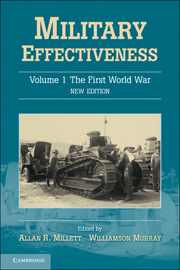Book contents
- Frontmatter
- Contents
- List of Contributors
- Preface to the First Edition
- Introduction: Military Effectiveness Twenty Years After
- Maps
- 1 The Effectiveness of Military Organization
- 2 Britain in the First World War
- 3 The Dynamics of Necessity: German Military Policy during the First World War
- 4 American Military Effectiveness in the First World War
- 5 Italy during the First World War
- 6 The French Army in the First World War
- 7 Japan, 1914–18
- 8 Imperial Russia's Forces at War
- 9 Military Effectiveness in the First World War
- Index
9 - Military Effectiveness in the First World War
Published online by Cambridge University Press: 05 June 2012
- Frontmatter
- Contents
- List of Contributors
- Preface to the First Edition
- Introduction: Military Effectiveness Twenty Years After
- Maps
- 1 The Effectiveness of Military Organization
- 2 Britain in the First World War
- 3 The Dynamics of Necessity: German Military Policy during the First World War
- 4 American Military Effectiveness in the First World War
- 5 Italy during the First World War
- 6 The French Army in the First World War
- 7 Japan, 1914–18
- 8 Imperial Russia's Forces at War
- 9 Military Effectiveness in the First World War
- Index
Summary
It will be clear by this stage that the First World War was not a conflict which, in the annals of history, is synonymous with military effectiveness. On the contrary, it has offered abundant evidence for a whole host of studies of military incompetence, whether in its psychological, tactical, or institutional aspects. It bequeathed to posterity the searing image of millions of men engaged for years in a futile struggle through the mud to achieve niggling gains at immense cost. It discredited the professional military almost everywhere, and the admirals fared little better. Within a short while after the 1919 settlement it was widely asserted that there had been no real winners; everyone had lost. Versailles had been a ‘Carthaginian peace,’ ultimately as dissatisfying to the victors as to the defeated. It has, understandably, been hard to get enthused about the military aspects of a conflict which, some seventy years later, is still being described as ‘the great seminal catastrophe of the century.’ Since the legend of the years 1914–18 is of near-universal ineffectiveness, what possible lessons could be drawn from it – apart from the 1920s conclusion that such a war should be avoided in the future at all costs?
Yet as soon as that question about ‘lessons’ is posed, of course, the importance of the First World War for the study of military effectiveness becomes obvious. Because it was the first, all-out, mass industrialized coalition war of this century, it tested effectiveness at all levels – political, strategic, operational, and tactical – and usually found things wanting.
- Type
- Chapter
- Information
- Military Effectiveness , pp. 329 - 350Publisher: Cambridge University PressPrint publication year: 2010



